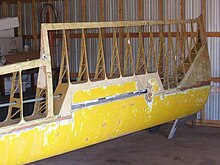| K7 Rhönadler | |
|---|---|

| |
| Role | GliderType of aircraft |
| National origin | West Germany |
| Manufacturer | Alexander Schleicher GmbH & Co |
| Designer | Rudolf Kaiser |
| Introduction | 1960 |
| Status | Production completed |
| Number built | 550 |
| Developed from | Schleicher Ka-2 |
| Variants | Schleicher ASK 13 |
The Schleicher K7 Rhönadler is a West German high-wing, two-seat, glider that was designed by Rudolf Kaiser and produced by Alexander Schleicher GmbH & Co.
Often referred to as the Ka-7 or K-7, the US Federal Aviation Administration type certificate officially designates it as the K7.
Design and development
The K7 was intended as a two-place trainer with good performance, a rare combination in trainers of its time.
The K7 is constructed with a welded steel tube fuselage, covered in doped aircraft fabric covering. The wing is a wooden structure with a doped fabric covering and employs a Goettingen 533 (16%) airfoil at the wing root, transitioning to a Goettingen 533 (14%) section at the wing tip. The wing features powerful dive brakes. The landing gear is a fixed monowheel. The earlier Ka-2 variant has a plywood monocoque fuselage.
After 550 had been built, the K7 was superseded in production by the Schleicher ASK 13.
The K7 can be converted into a K7/13 with a conversion kit to lower the wing to the mid-wing position and installation of a one-piece canopy, rendering the aircraft similar to the ASK-13.
Operational history
A K7 was flown to a new world multi-place glider speed record for flight around a 500 km (311 mi) triangle of 84 km/h (52 mph) in 1964 in South Africa.

A K7 was assigned to 2 Wing AAFC and used to train Australian Air Force Cadets 228 Squadron at Bundaberg from 2007 to 2014.
Variants
- Ka-2
- Early version with a plywood monocoque fuselage
- K7
- Main production version with a steel tube fuselage.
- K7/13
- K7 converted to a mid-wing arrangement, plus a single piece canopy, to resemble an AS-K 13
Specifications (K7)


Data from Sailplane Directory, Soaring and FAA Type Certificate 7g3, and The World's Sailplanes:Die Segelflugzeuge der Welt:Les Planeurs du Monde
General characteristics
- Crew: one
- Capacity: one passenger
- Length: 8.15 m (26 ft 9 in)
- Wingspan: 16.0 m (52 ft 6 in)
- Wing area: 17.56 m (189.0 sq ft)
- Aspect ratio: 14.6:1
- Airfoil: root: Goettingen 533 (16%), mid: Goettingen 533 (14%), tip: Goettingen 533 (14%)
- Empty weight: 282 kg (622 lb)
- Max takeoff weight: 484.5 kg (1,068 lb)
Performance
- Stall speed: 59 km/h (37 mph, 32 kn)
- Never exceed speed: 200 km/h (120 mph, 110 kn)
- Rough air speed max: 130 km/h (81 mph; 70 kn)
- Aerotow speed: 130 km/h (81 mph; 70 kn)
- Winch launch speed: 100 km/h (62 mph; 54 kn)
- g limits: +4 -2
- Maximum glide ratio: 26:1 at 83 km/h (52 mph)
- Rate of sink: 0.70 m/s (138 ft/min) at 67 km/h (42 mph)
- Wing loading: 27.34 kg/m (5.60 lb/sq ft)
See also
Aircraft of comparable role, configuration, and era
Related lists
Notes
- ^ Activate Media (2006). "Ka-7 Schleicher". Archived from the original on 17 November 2011. Retrieved 23 July 2011.
- ^ Said, Bob (November 1983). "1983 Sailplane Directory". Soaring Magazine. Soaring Society of America. USPS 499-920.
- ^ Federal Aviation Administration (February 1961). "Type Certificate Data Sheet No. 7g3" (PDF). Retrieved 23 July 2011.
- Lednicer, David (2010). "The Incomplete Guide to Airfoil Usage". Retrieved 23 July 2011.
- "Gliding". 1 January 2018. Retrieved 20 April 2020.
- Shenstone, B.S.; K.G. Wilkinson; Peter Brooks (1958). The World's Sailplanes:Die Segelflugzeuge der Welt:Les Planeurs dans Le Monde (in English, French, and German) (1st ed.). Zurich: Organisation Scientifique et Technique Internationale du Vol a Voile (OSTIV) and Schweizer Aero-Revue. pp. 9–13.
References
- Activate Media (2006). "Ka-7 Schleicher". Archived from the original on 17 November 2011. Retrieved 23 July 2011.
- Said, Bob (November 1983). "1983 Sailplane Directory". Soaring Magazine. Soaring Society of America. USPS 499-920.
- Federal Aviation Administration (February 1961). "Type Certificate Data Sheet No. 7g3" (PDF). Retrieved 23 July 2011.
- Lednicer, David (2010). "The Incomplete Guide to Airfoil Usage". Retrieved 23 July 2011.
- Shenstone, B.S.; K.G. Wilkinson; Peter Brooks (1958). The World's Sailplanes:Die Segelflugzeuge der Welt:Les Planeurs dans Le Monde (in English, French, and German) (1st ed.). Zurich: Organisation Scientifique et Technique Internationale du Vol a Voile (OSTIV) and Schweizer Aero-Revue. pp. 81–87.
External links
[REDACTED] Media related to Schleicher K 7 at Wikimedia Commons
| Schleicher gliders | |
|---|---|
| Wooden construction pre-World War II | |
| Wooden construction (Rudolf Kaiser) | |
| GRP construction (Rudolf Kaiser) | |
| GRP construction (Gerhard Waibel) | |
| GRP construction (Martin Heide) | |
| GRP construction (Michael Greiner) | |
| GRP construction - unspecified designer | |